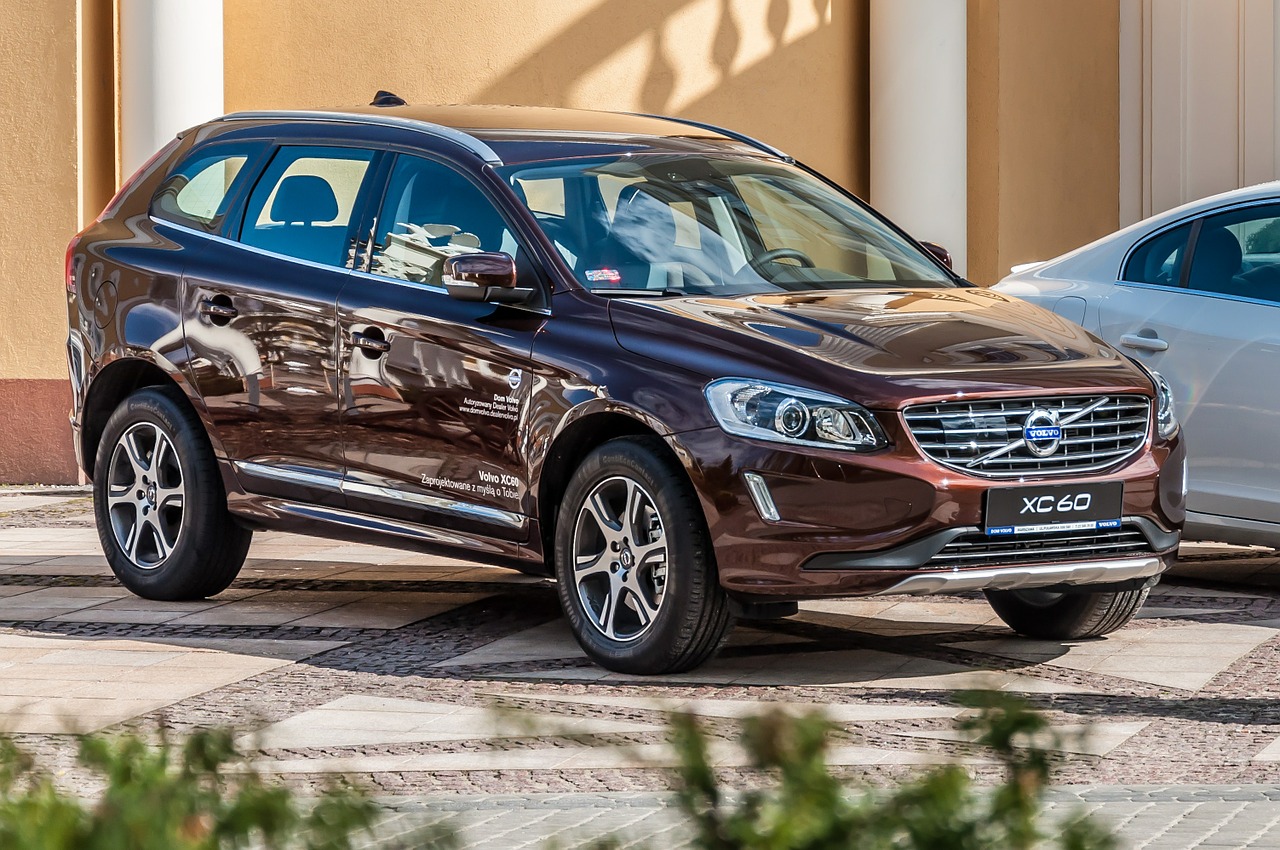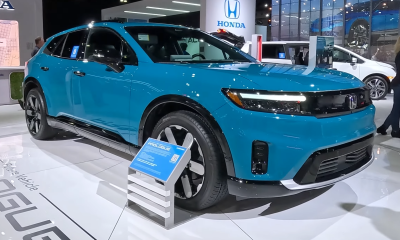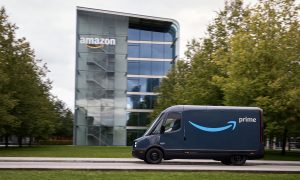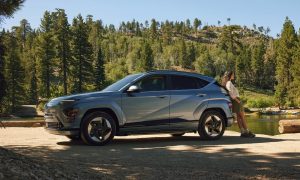

News
Volvo faces legal pushback in California on possible pivot to Tesla-style direct sales model
On Tuesday, the California New Car Dealers Association (CNCDA) filed a petition against Volvo USA with California’s New Motor Vehicle Board claiming the legacy car maker violates state franchise laws banning manufacturer competition with dealerships. The group claimed the “Care by Volvo” (CbV) subscription service launched in early 2018 which provides all-in-one packages of 24-month leases, premium insurance, concierge service, and most vehicle maintenance, was using Volvo dealers as de facto “agents” in an effective practice of dealing directly to consumers. The move is reminiscent of Tesla’s struggles, itself being the subject of dealer franchise-focused legal actions. However, the legal questions aside, the sum of CNCDA’s complaints additionally indicate its objection to Volvo’s possible ongoing shift to a Tesla-style overall direct-sales model.
In Volvo’s CbV subscription plan, buyers select from two currently offered models – the S60 and XC40, including customizations – via an app or a corporate-run website. Once the car selection is final, an agent from Volvo’s financial services company (the “Volvo Concierge”) contacts the buyer and finalizes the package particulars, after which delivery is scheduled at a local participating dealership. During the online process, the customer is given a guaranteed monthly subscription price with the option to upgrade after 12 months and chooses the dealership that will complete the sale. Volvo provides the financing directly through a separate financing branch, and the insurance is provided by Liberty Mutual. The dealer handles the final sales contract, payment, and vehicle hand-off.
While the dealerships participate in the CbV program voluntarily and receive an 8% sales commission, CNCDA claims the process significantly limits the dealer’s ability to build a (profitable) relationship with the customer and eliminates dealer earnings potentials stemming from financing services and other package “add-ons” during the sales process. On its face, this might seem like a reasonable argument, but Volvo’s perspective seems to be addressing customer preferences, a new era of sales strategies, and an effort to reach a new customer market. In an aim to make the brand more appealing to a younger generation accustomed to app-based ride-hailing and a la carte video entertainment services, Volvo may be hoping CbV will help them make inroads towards Millennials in particular.

In an interview with Global Fleet, Alan Visser, CEO of Volvo’s Chinese sister brand, Lynk & Co., detailed how the Millennial connection is explicitly part of that company’s subscription-only business model: “On the other [hand], there is [the] smartphone aspect…Millennials want maximum flexibility and all-inclusive pricing rather than long-term commitments and hassle. Our subscription model is more than just a private lease. It includes services like pick-up and delivery, cleaning, and lots of other things I cannot disclose just yet,” he stated. Also, Lynk & Co intends to only sell hybrids and/or battery electrics, adding yet another Volvo parallel to Tesla. That, and its plan for showcasing its vehicles prior to customer purchase: “In large urban areas we will have so-called offline stores: small, sociable brand boutiques,” Visser additionally explained in the interview.
In their petition, the California dealer’s group made the connection between Lynk & Co and Volvo USA a key part of their case for Volvo’s competition law violation. According to Jalopnik’s review of a pre-production model of Lynk’s first vehicle, the direct-sales subscription is possibly being tested in the US via the Care by Volvo program. “They’re very eager to try out this subscription model of car ownership, or subscribership…They’re sort of testing the waters with the Care by Volvo program, which is proving to be a good plan,” Torchinsky writes, summarizing his talks with the company’s representatives. This article was referenced in CNCDA’s petition against Volvo’s CbV program. Torchinsky goes on to further describe how the dealership experience “sucks” enough for consumers to have opened up a new market for doing car sales business which Lynk has intentionally capitalized on.

Protecting dealers doesn’t appear to be the main priority of CNCDA. In their petition, the New Car Dealers Association seems to be taking the biggest issue with Volvo’s possible negative position on the franchise model entirely, using the legal system as a toolkit to keep customers stuck in an aging infrastructure rather than innovating with the times and finding less restrictive ways to make everyone happy. “‘Subscription programs’ like CbV have been described as a way for the manufacturer to cut out the dealer and ultimately eliminate the franchise model,” the group stated in the introduction of their petition to the New Motor Vehicle Board. Where franchise laws were set up to protect dealers from forced manufacturer bidding, the association seems to be attempting to morph manufacturers wanting to do their own customers’ bidding into an attack on dealer rights. Tesla has certainly encountered this type of morphing even without the challenge of having private dealerships.
In December of last year, a Connecticut state court judge concluded that Tesla’s Greenwich Ave. gallery was operating like a dealership and required a license to do so, something the electric vehicle company is not eligible for because it doesn’t have franchises. The Connecticut Automotive Retailers Trade Association (CARA) was the party responsible for initiating the proceedings which led to the judgment, an organization often at the front lines of defending the state’s franchise laws from would-be offenders. CARA holds the position that vehicle sales should only be conducted through licensed independent dealerships, leaving direct-sales manufacturers like Tesla with limited options for providing its products to customers wanting to buy them.
The car subscription model isn’t unique to Volvo. Luxury car manufacturers especially seem to have also discovered the new market potential of app-driven car flexibility: Access by BMW has price tiers in the $2000-$3700 range for their packages (which include unlimited vehicle swapping), but it’s only available in Nashville, Tennessee for now. The UK-only Carpe by Jaguar Land Rover has $1200-$2900 packages with similar features as CbV, the Mercedez-Benz Collection is similar in price to Carpe, and a few others in that range are being developed and expanded by their respective manufacturers. Several third-party subscription services have also popped up with more flexible lease terms and more economical pricing. Clearly, the trend is showing data points that are worth investment attention.
With all the controversy, it might not even be dealerships that stand to lose the most with subscription models. The case has been made for classifying them as rental cars, which would be another market that might take issue with manufacturers latest ideas for doing business. Some of the services, like Flexdrive, are practically set up to be permanent rental solutions. As with all things, though, only time will tell.
2019-1-15 CNCDA Petition Re… by on Scribd
Elon Musk
Tesla Supercharger Diner food menu gets a sneak peek as construction closes out
What are you ordering at the Tesla Diner?

The Tesla Supercharger Diner in Los Angeles is nearing completion as construction appears to be winding down significantly. However, the more minor details, such as what the company will serve at its 50s-style diner for food, are starting to be revealed.
Tesla’s Supercharger Diner is set to open soon, seven years after CEO Elon Musk first drafted the idea in a post on X in 2018. Musk has largely come through on most of what he envisioned for the project: the diner, the massive movie screens, and the intended vibe are all present, thanks to the aerial and ground footage shared on social media.
We already know the Diner will be open 24/7, based on decals placed on the front door of the restaurant that were shared earlier this week. We assume that Tesla Optimus will come into play for these long and uninterrupted hours.
The Tesla Diner is basically finished—here’s what it looks like
As far as the food, Tesla does have an email also printed on the front door of the Diner, but we did not receive any response back (yet) about what cuisine it will be offering. We figured it would be nothing fancy and it would be typical diner staples: burgers, fries, wings, milkshakes, etc.
According to pictures taken by @Tesla_lighting_, which were shared by Not a Tesla App, the food will be just that: quick and affordable meals that diners do well. It’s nothing crazy, just typical staples you’d find at any diner, just with a Tesla twist:
Tesla Diner food:
• Burgers
• Fries
• Chicken Wings
• Hot Dogs
• Hand-spun milkshakes
• And more https://t.co/kzFf20YZQq pic.twitter.com/aRv02TzouY— Sawyer Merritt (@SawyerMerritt) July 17, 2025
As the food menu is finalized, we will be sure to share any details Tesla provides, including a full list of what will be served and its prices.
Additionally, the entire property appears to be nearing its final construction stages, and it seems it may even be nearing completion. The movie screens are already up and showing videos of things like SpaceX launches.
There are many cars already using the Superchargers at the restaurant, and employees inside the facility look to be putting the finishing touches on the interior.
🚨 Boots on the ground at the Tesla Diner:
— TESLARATI (@Teslarati) July 17, 2025
It’s almost reminiscent of a Tesla version of a Buc-ee’s, a southern staple convenience store that offers much more than a traditional gas station. Of course, Tesla’s version is futuristic and more catered to the company’s image, but the idea is the same.
It’s a one-stop shop for anything you’d need to recharge as a Tesla owner. Los Angeles building permits have not yet revealed the date for the restaurant’s initial operation, but Tesla may have its eye on a target date that will likely be announced during next week’s Earnings Call.
News
Tesla’s longer Model Y did not scale back requests for this vehicle type from fans
Tesla fans are happy with the new Model Y, but they’re still vocal about the need for something else.

Tesla launched a slightly longer version of the Model Y all-electric crossover in China, and with it being extremely likely that the vehicle will make its way to other markets, including the United States, fans are still looking for something more.
The new Model Y L in China boasts a slightly larger wheelbase than its original version, giving slightly more interior room with a sixth seat, thanks to a third row.
Tesla exec hints at useful and potentially killer Model Y L feature
Tesla has said throughout the past year that it would focus on developing its affordable, compact models, which were set to begin production in the first half of the year. The company has not indicated whether it met that timeline or not, but many are hoping to see unveilings of those designs potentially during the Q3 earnings call.
However, the modifications to the Model Y, which have not yet been officially announced for any markets outside of China, still don’t seem to be what owners and fans are looking forward to. Instead, they are hoping for something larger.
A few months ago, I reported on the overall consensus within the Tesla community that the company needs a full-size SUV, minivan, or even a cargo van that would be ideal for camping or business use.
Tesla is missing one type of vehicle in its lineup and fans want it fast
That mentality still seems very present amongst fans and owners, who state that a full-size SUV with enough seating for a larger family, more capability in terms of cargo space for camping or business operation, and something to compete with gas cars like the Chevrolet Tahoe, Ford Expedition, or electric ones like the Volkswagen ID.BUZZ.
We asked the question on X, and Tesla fans were nearly unanimously in support of a larger SUV or minivan-type vehicle for the company’s lineup:
🚨 More and more people are *still* saying that, despite this new, longer Model Y, Tesla still needs a true three-row SUV
Do you agree? https://t.co/QmbRDcCE08 pic.twitter.com/p6m5zB4sDZ
— TESLARATI (@Teslarati) July 16, 2025
Here’s what some of the respondents said:
100% agree, we need a larger vehicle.
Our model Y is quickly getting too small for our family of 5 as the kids grow. A slightly longer Y with an extra seat is nice but it’s not enough if you’re looking to take it on road trips/vacations/ kids sports gear etc.
Unfortunately we…
— Anthony Hunter (@_LiarsDice_) July 17, 2025
Had to buy a Kia Carnival Hybrid because Tesla doesn’t have a true 3 row vehicle with proper space and respectable range. pic.twitter.com/pzwFyHU8Gi
— Neil, like the astronaut (@Neileeyo) July 17, 2025
Agreed! I’m not sure who created this but I liked it enough to save it. pic.twitter.com/Sof5nMehjS
— 🦉Wise Words of Wisdom – Inspirational Quotes (IQ) (@WiseWordsIQ) July 16, 2025
Tesla is certainly aware that many of its owners would like the company to develop something larger that competes with the large SUVs on the market.
However, it has not stated that anything like that is in the current plans for future vehicles, as it has made a concerted effort to develop Robotaxi alongside the affordable, compact models that it claims are in development.
It has already unveiled the Robovan, a people-mover that can seat up to 20 passengers in a lounge-like interior.
The Robovan will be completely driverless, so it’s unlikely we will see it before the release of a fully autonomous Full Self-Driving suite from Tesla.
Energy
Tesla launches first Virtual Power Plant in UK – get paid to use solar
Tesla has launched its first-ever Virtual Power Plant program in the United Kingdom.

Tesla has launched its first-ever Virtual Power Plant program in the United Kingdom. This feature enables users of solar panels and energy storage systems to sell their excess energy back to the grid.
Tesla is utilizing Octopus Energy, a British renewable energy company that operates in multiple markets, including the UK, France, Germany, Italy, Spain, Australia, Japan, New Zealand, and the United States, as the provider for the VPP launch in the region.
The company states that those who enroll in the program can earn up to £300 per month.
Tesla has operated several VPP programs worldwide, most notably in California, Texas, Connecticut, and the U.S. territory of Puerto Rico. This is not the first time Tesla has operated a VPP outside the United States, as there are programs in Australia, Japan, and New Zealand.
This is its first in the UK:
Our first VPP in the UK
You can get paid to share your energy – store excess energy in your Powerwall & sell it back to the grid
You’re making £££ and the community is powered by clean energy
Win-win pic.twitter.com/evhMtJpgy1
— Tesla UK (@tesla_uk) July 17, 2025
Tesla is not the only company that is working with Octopus Energy in the UK for the VPP, as it joins SolarEdge, GivEnergy, and Enphase as other companies that utilize the Octopus platform for their project operations.
It has been six years since Tesla launched its first VPP, as it started its first in Australia back in 2019. In 2024, Tesla paid out over $10 million to those participating in the program.
Participating in the VPP program that Tesla offers not only provides enrolled individuals with the opportunity to earn money, but it also contributes to grid stabilization by supporting local energy grids.
-

 Elon Musk1 day ago
Elon Musk1 day agoWaymo responds to Tesla’s Robotaxi expansion in Austin with bold statement
-

 News1 day ago
News1 day agoTesla exec hints at useful and potentially killer Model Y L feature
-

 Elon Musk2 days ago
Elon Musk2 days agoElon Musk reveals SpaceX’s target for Starship’s 10th launch
-

 Elon Musk3 days ago
Elon Musk3 days agoTesla ups Robotaxi fare price to another comical figure with service area expansion
-

 News1 day ago
News1 day agoTesla’s longer Model Y did not scale back requests for this vehicle type from fans
-

 News1 day ago
News1 day ago“Worthy of respect:” Six-seat Model Y L acknowledged by Tesla China’s biggest rivals
-

 News2 days ago
News2 days agoFirst glimpse of Tesla Model Y with six seats and extended wheelbase
-

 Elon Musk2 days ago
Elon Musk2 days agoElon Musk confirms Tesla is already rolling out a new feature for in-car Grok
















